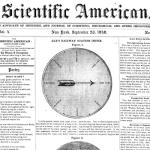Last month, we reported that a Dutch journalist named Jannes van Roermund collaborated with the infamous troll and anti-GM
anti-science
For many years, the anti-GMO movement has advanced a compelling narrative about its struggle against the biotech industry—pejoratively referred to as 'Big Ag.' According to this story, organic food activists and environmental groups are independen
In his Farewell Address, President Eisenhower warned of the military-industrial complex, a partnership between the military and defense industry that was financially incentivized to promote war over peace.
For Scientific American, the year 2019 will go down in history, but certainly not in the way the 174-year-old publication intended. After publishing at least two thoroughly unscientific and inept articles, SciAm has produced a third.
When I was editor of RealClearScience, we considered The Guardian to be a daily must-read.
How much lower can the New York Times go?
The Age of Social Media has been an eye-opening experience. As a friend of mine once noted, "Social media has made us realize that our neighbors are a bunch of jerks."
The AAAS, which stands for the American Association for the Advancement of Science, is one of the foremost pro-science organizations in the world.
How do you know when a "study" isn't really a study? When the people who performed it wrote up a brochure hyping its results before actually bothering to publish a scientific paper.
You don't come to this website for (bad) golf tips. Instead, you come here for our take on the latest scientific and consumer issues of the day. Trust us. It's better that way.












